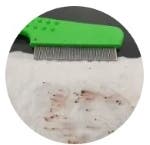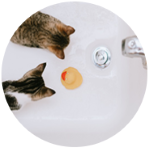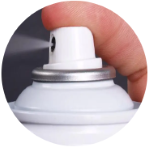How to get rid of fleas on kittens
Kittens are adorable little bundles of fur. But that fur can easily harbour fleas, which can lead to serious health issues. While fleas on adult cats are relatively simple to treat, fleas on kittens can be trickier.
Find out how to get rid of fleas on kittens and how to prevent your kitten becoming an easy target through using preventative treatments.
1. Treat your kitten for fleas
Generally speaking, flea treatments are unsuitable for very young kittens under the age of eight weeks old. Make sure you know what flea prevention tactics you can deploy to keep your kitten flea-free depending on their age.
How to get rid of fleas on kittens that are newborn up to eight weeks old
One of the easiest ways to keep kittens clear of fleas is to ensure their home is a flea-free zone. But, in the event of fleas, here are some ways to keep fleas away from your new-born bundle of fluff until they’re eight weeks of age.
Use a flea comb

Flea combs are designed to pick out tiny fleas from fur. The fine-toothed combs help you to identify and manually remove fleas. Brush your kitten over a white surface, so you can easily identify the fleas, which will appear as small, dark brown insects. Pay attention to the kitten’s belly and armpits and the base of their tail where fleas like to hide. If you spot black specks, similar to pepper, at the base of the fur it’s likely to be flea faeces, known as ‘flea dirt’. Even if you don’t spot the fleas, this is a clear sign that you have an infestation on your hands.
A flea comb will only remove fleas present at that time, and as flea eggs, larvae and pupae hang around in the environment, you’ll need to keep combing your kitten regularly to pick up any new fleas as they develop.
Bathe your kitten

Fleas aren’t as keen on water as they are on your kitten. Bathing your kitten in warm water with vet-recommended wash can help flush out the fleas taking refuge in their fur. However, this will only remove fleas that are on the fur there and then and won’t help to prevent re-infestation. To really be sure you're removing all the fleas, you may need to bathe your kitten regularly or combine bathing with using a flea comb.
If you do bathe your kitten it is important to ensure they remain warm and are dried carefully and thoroughly after the bath.
Use flea spray

Some flea sprays can be used on young kittens. Always check the packaging and speak to your vet if you are unsure.
How to get rid of fleas on kittens that are over eight weeks old
Many flea treatments available are suitable for older kittens aged 8 to 12 weeks. There is such a vast array of flea treatments to choose from – tablets, spot-ons and collars – that it can be difficult to know which to choose.

Seresto Flea and Tick Control collar protects your kitten for 7-8 months in a single application. The collar releases its active ingredients at a slow and steady rate. It’s able to kill fleas and ticks through contact, no biting required1, and can be used on kittens from 10 weeks old.

Spot-on products usually offer monthly protection. They are a popular treatment among pet owners because they’re easily applied to the skin at the back of the kitten’s (or cat’s) neck. Different active ingredients in the products will treat a flea infestation differently: some spot-ons will interrupt the flea life cycle simply by killing adult fleas, while others will target larvae too.
Advantage for cats is a monthly spot-on which can be used on kittens from the age of 8 weeks and older. It works by spreading throughout the skin and fur to kill fleas through contact1 within 24 hours. And because the bloodthirsty critters don’t have to bite your kitten, it reduces possible skin irritation from itchy flea bites.

Tablets are another commonly used method to protect cats and kittens from fleas. They can be given either by putting the tablet in with your kitten's food or treats, or by gently giving it directly into their mouth. Speak with your vet about tablets for preventative flea control in kittens. If your kitten already has an infestation of fleas, one Capstar tablet starts killing adult fleas in just 15-30 minutes and lasts 24 hours - and it can be used in kittens over 4 weeks old and weighing over 1kg. To prevent a re-infestation of fleas, you'll need to use a longer-acting preventative product afterwards too.
Remember, your kitten will only be fully protected from fleas when regularly using a preventative flea product. It can help to make a note of the date that you first applied, so you know when to retreat. When applying flea treatments, you will need to choose the right product for your kitten’s age and weight; always make sure you read the label and consult your vet if you’re unsure.
Responsible use of medicines in pets
When we use pet health treatments, be they for parasites or for other health issues, it's essential that they are used responsibly. Find out more about the principles of responsible use of medicines in pets.
Flea treatment options
2. Treat other animals in the household
As well as getting rid of fleas on your kitten, it's also important to treat all other pets in the household. If certain animals are left untreated, fleas will continue their lifecycle and could re-infest your kitten. If the kitten's mother is in the home, it's important to treat her too. There are some products suitable for use in pregnant and nursing cats but it's best to check with your vet before use.
3. Get rid of fleas in the home
If a flea has snuck into your home and fed on your kitten, that’s all they need to begin laying eggs rapidly. The fleas you find on your pets are just 5% of a home infestation. Flea eggs, larvae and pupae make up the other 95% and are adept at hiding in carpets, furniture and cracks in floorboards and walls.
The environmental flea life stages can lay dormant in the home waiting to hatch until the conditions are right when they will re-infest your home and your kitten. When you have a flea problem, you’ll need to clean your home thoroughly and continue the process until you’re sure you’ve managed to disrupt the flea life cycle to stop them from developing.
- Vacuum every day - You'll need to vacuum the carpets and floors every day to help remove eggs and larvae, and to bring those that are buried deep to the surface. Remember to empty the vacuum into the outside bin to stop flea eggs hatching inside.
- Wash bedding, curtains and soft furnishings - Remove pet fur from bedding, curtains and soft furnishings (and dispose of it in general waste) before washing items on a hot wash to kill off any flea life stages that may be hiding there.
- Other household treatments - Use of an additional household flea treatment may also be recommended. Speak to your vet or local pet retail store for more information about the use of these products.
- Mehlhorn et al. Parasitol Res (2001) 87:198-207, information is regarding mode of action and is not intended to relate to speed of kill or to imply parasites can be completely stopped from biting.
